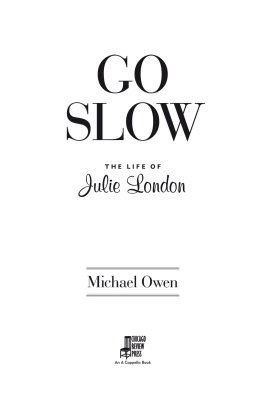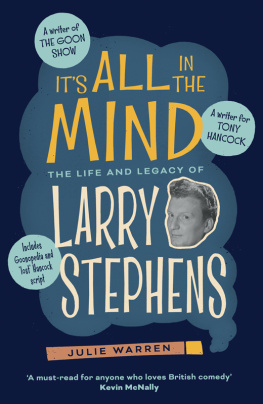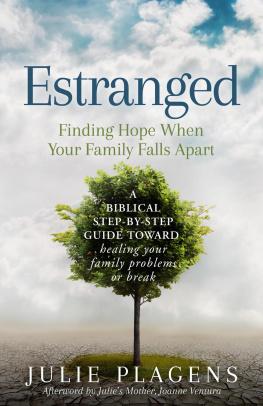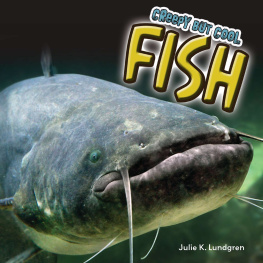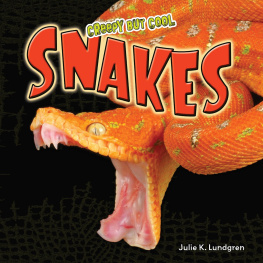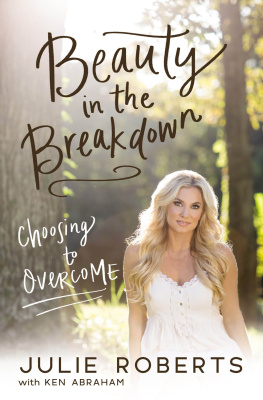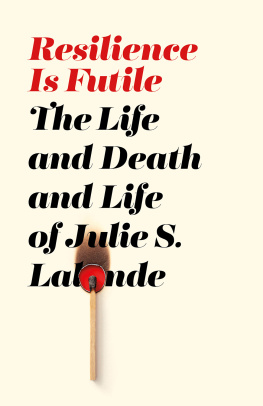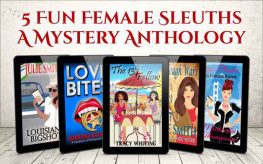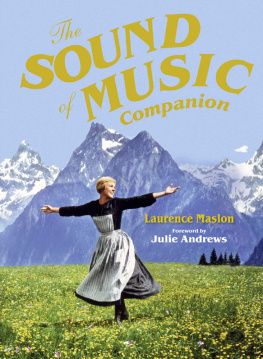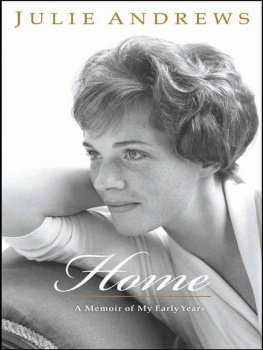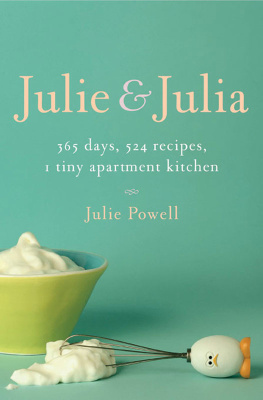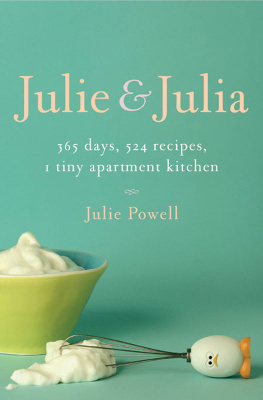Sommaire
Pagination de l'dition papier
Guide
Copyright 2017 by Michael R. Owen
Foreword copyright 2017 by Arthur Hamilton
All rights reserved
First edition
Published by Chicago Review Press Incorporated
814 North Franklin Street
Chicago, Illinois 60610
ISBN 978-1-61373-859-7
Library of Congress Cataloguing-in-Publication Data
Names: Owen, Michael, 1962
Title: Go slow: the life of Julie London / Michael Owen.
Description: First edition. | Chicago, Illinois: Chicago Review Press,
[2017] | Includes bibliographical references and index.
Identifiers: LCCN 2016048585 (print) | LCCN 2016049827 (ebook) | ISBN
9781613738573 (cloth) | ISBN 9781613738580 (adobe pdf) | ISBN
9781613738597 (epub) | ISBN 9781613738603 (kindle)
Subjects: LCSH: London, Julie, 19262000. | SingersUnited
StatesBiography. | Motion picture actors and actressesUnited
StatesBiography. | Television actors and actressesUnited
StatesBiography.
Classification: LCC ML420.L866 O94 2017 (print) | LCC ML420.L866 (ebook) |
DDC 784.42164092 [B] dc23
LC record available at https://lccn.loc.gov/2016048585
Typesetting: Nord Compo
Printed in the United States of America
5 4 3 2 1
This digital document has been produced by Nord Compo.
To my wife, Libbie Hodas, with love for helping me
get to the heart of the story.
And to my late mother, Johanna Owen,
for her lifetime of encouragement.
Go slow, ooh, ooh, honey,
Take it easy on the curves.
When love is slow, ooh honey,
What a tonic for my nerves.
Go Slow by Russell Garcia and Ned Kronk
Acknowledgments
I N LONELINESS AND SOLITUDE, the first chapter of his 1963 collection The Eternal Now, philosopher and theologian Paul Tillich made the compelling statement that the mystery of a person cannot be encompassed by a neat description of [her] character. During the years it took to research and write this book about the life and career of Julie London, I came to understand Tillichs words more fully.
Each person I spoke with about Julie gave me another facet of her character to consider, and for their assistance I am forever grateful. Thoughts and memories, either in person or via phone conversations and e-mails, came from the following: James Austin, the late Don Bagley, John Bhler, Colin Bailey, Bob Bain, Jim Bawden, Chuck Berghofer, Hal Blaine, Dennis Budimir, Buzz Cason, Gene Cipriano, Edwin Greines Cohen, Lee Evans, Robert Fuller, the late Russ Garcia, Murray Garrett, the late Snuff Garrett, the late Dick Gauthier, Terry Gibbs, Arthur Hamilton (who was also kind enough to write the foreword to my book), Enid Harlow, Harry Hawthorne, Bones Howe, the late Johnny Mann, Leo Monahan, Dick Nash, Dave Pell, Bucky Pizzarelli, Emil Richards, Lyle Ritz, Tony Russell, Jill Schoelen, Karen Schoemer, Cal Sexton, Joe Sidore, Maynard Sloate, Al Stoffel, Kevin Tighe, Lenny Waronker, Peggy Webber, Tom Williams, Mari Wilson, and Julies daughter and granddaughter, Lisa and Ryann Breen. My sincere thanks to all of you.
I particularly want to express my appreciation for three individuals whose kindness and interest in the project went beyond the norm. Linda Wheeler Lackey was Julie Londons friend for more than thirty years. From the moment we met in Palm Springs in 2011, Linda has encouraged me to tell Julies story. Cynnie Troup and Bob Bayles were endlessly generous with their time and provided me with access to a wealth of material that had been in storage since Julies death. Cynnie regaled me with funny stories and was a gracious host on my visits to Los Angeles. Bob, whos married to Cynnies sister Ronne, shared many rare images and audio recordings and helped in other ways too numerous to mention.
Thank you as well to Lynn Todd, who provided fascinating information on the history of the Peck family, much of it written by her mother, Jeanne Woodson Labadie, the daughter of Julie Londons aunt Ethel Woodson (ne Peck).
A special debt of posthumous gratitude to Julies longtime friend Dorothy LaPointe Gurnee, who compiled nearly forty scrapbooks on the lives and careers of Julie and Bobby Troup.
My thanks also go out to the following people, who shared information, resources, contacts, and/or words of encouragement along the way: Gene Alvarez, Polly Armstrong (formerly of the Stanford University Library, Department of Special Collections), Marilee Bradford, Elliot Brown, Professor Keen Butterworth, Steven Cerra, Frank Collura, Ned Comstock (Cinematic Arts Library at the University of Southern California), Professor Richard Crawford, Michael Cuscuna, Professor Mike Evans, Carmen Fanzone (American Federation of Musicians, Local 47), Michael Feinstein, James Harrod, Chad Hemus, my brother-in-law Glenn Hodas, Phyllis Kessel, Arthur Krim, Jaime Lennox (San Diego State University), Shane MacDonald (the American Catholic University History Research Center and University Archives), Ron McMaster, Daniel Moyer, Mark Quigley (UCLA Film & Television Archive), Michael Rabkin and Chip Tom, Bill Reed, Lauren Rogers (University of Mississippi, Archives and Special Collections), Brett Service (Warner Bros. Archives, School of Cinematic Arts, University of Southern California), Maurice Summerfield, Steve Taravella, Richard Thompson (San Bernardino County Historical Society), Janice Torbet (San Francisco Public Library), Mel Vapour (East Bay Media Center), and to my friends at the Library of Congress: Mark Eden Horowitz, Loras Schissel, and Ray White (all of the Music Division), and Karen Fishman (Motion Picture, Broadcasting, and Recorded Sound Division).
And a final thank-you to the folks at Chicago Review Press who brought Go Slow to fruition: senior editor Yuval Taylor, project editor Ellen Hornor, and copyeditor Julia Loy.
Foreword
W E WERE SEVENTEEN TOGETHER. I borrowed my brothers car to take her to our senior prom. She was always singing. We tried to outremember each other, reciting the lyrics of once-popular songs. Her favorite word was warm. I was just beginning to write, and she was a great audience for anything I brought to her.
Michael Owen, in his marvelous memory of her, brings her back into my life (and into yours), accurately describing her years as a film actress, television performer, and nightclub and recording star. She was all those things but never wanted to be any of them. She just loved to sing, almost to herself. Her voice was a whisper.
Three or four years after high school, she called and told me she was married to actor/producer Jack Webb, who was planning to produce a television series called Pete Kellys Blues. Julie asked me if I was still writing songs and if I had written any blues songs. I lied and said, Of course. She invited me for dinner the following Thursday nightwhich gave me four days to write three blues songs.
Jack liked what he heard and put me under contract. (I think its important to tell you that, at that time, I was delivering prescription drugs for the Horton & Converse pharmacy, earning fifty bucks a weekso you can imagine how Julie changed the course of my life.)
A few weeks ago, the National Recording Preservation Board of the Library of Congress sent me a certificate honoring the selection of Julie Londons recording of Cry Me a River to the National Recording Registry.
We remained friends throughout her life. I still hear her voice in my head. I can still see her. She is still seventeen.
Arthur Hamilton
Writer of Cry Me a River
Beverly Hills, California
July 2016
Prologue
Spring/Summer 1955
Y OU OPEN IN THREE weeks!
Julie London had done everything she could possibly think of to forget about her upcoming nightclub debut. She heard what her boyfriend, songwriter and pianist Bobby Troup, was telling her. She just didnt want to deal with it. Two months earlier he had persuaded her to make a few demos in the hopes of getting her a recording contract. She laughed and said she just enjoyed singing songs she liked among friends. Besides, she was about to resume the acting career she had abandoned a few years earlier. Why in the world would anyone want to hear her sing? Relieved when the recordings were quickly rejected, Julie was certain that Bobbys nagging attempts to convince her she could also have a career as a singer had finallythankfullycome to an end.

